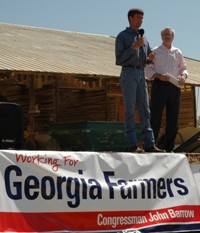| Barrow Talks Natural Gas, Fertilizer Prices with Screven County Residents |
 |
 |
|
Discusses bipartisan legislation that will get prices under control for Georgia farmers; provide price stability for over 56 million homeowners nationwide
Sylvania, GA - Standing on the bed of a low-boy trailer out front of Boddiford Farm Services, 12th District Congressman John Barrow (D-GA) today spoke to a group of Georgia farmers and local area residents about the steps he's taking in Congress to help bring some much needed stability and predictability to the nation's natural gas prices.
Barrow, Ranking Member of the Small Business Subcommittee on Rural Enterprises, Agriculture, and Technology, held a subcommittee hearing last month to help raise awareness among fellow lawmakers in Washington about the negative effects rising natural gas prices are having on producers, consumers and farmers across the country. At Rep. Barrow's invitation, Screven County farmer Ben Boyd testified at the hearing - giving a first hand account of how natural gas prices are affecting his farm in Georgia.
Currently, natural gas makes up 70-90% of the production costs for nitrogen based fertilizer, and it also heats over 56 million American homes. Despite record high natural gas inventories and near record production in 2003, prices continue to be extremely volatile and are prone to huge spikes. As a result, many of the nation's farmers have seen their fertilizer costs more than double, while those Americans living on fixed incomes, like many seniors, find themselves spending more and more of their limited income to heat their homes.
"Farmers and homeowners all across the nation are faced with natural gas prices that just don't add up," Barrow said. "When natural gas prices jump to new record highs each time you get your bill, that makes running a business or living on a budget practically impossible. That's why I believe it's time that Congress steps up to the plate and finds a way to help get these prices under control."
Last Thursday, Barrow joined with Republican Congressman Sam Graves of Missouri to introduce bipartisan legislation that will help bring price stability back to the natural gas market. Without harming free market principles, the Graves-Barrow Commodity Improvement Exchange Act of 2005 would restore common-sense trading limits found on virtually every other publicly traded commodity - limiting daily trading prices of natural gas to an 8 percent increase or decrease, and requiring the CFTC (Commodity Futures Trading Commission) to review and approve future natural gas contracts.
The bill would also increase and impose civil and criminal penalties of up to $1 million for anyone found manipulating or attempting to manipulate the price of a publicly traded commodity, which would include natural gas. According to David Gary, the deputy director of the CFTC, firms and individual traders who engaged in false price reporting of natural gas paid out more than $300 million in penalties in recent years.
Pointing at a graph detailing the monthly average price for natural gas since January of 1990, Barrow stressed that his legislation, if passed by Congress, will restore the price stability consumers and fertilizer producers knew prior to 2000, when Congress passed the Commodity Futures Modernization Act (CFMA).
CFMA altered the fundamental trading rules for natural gas - allowing greater speculation by a limited number of natural gas traders. Prices, which for the previous 10 years had been stable at around $2.18/MMBTU, immediately became much more volatile after the bill passed, with price spikes of up to $11 pushing the average price of natural gas to $4.50 MMBTU - more than double what it had been before the trading rules were change. To put this into perspective, every $1/MMBTU increase in the price of natural gas on the market costs consumers $23.1 billion annually.
"This is common sense legislation that looks at the problem of rising natural gas prices, finds the source of that problem, and then fixes it," Barrow said. "Our farmers can't wait for Congress to drag their feet coming up with far fetched proposals that may not even bring price relief for years to come. We need real solutions that will address the problem now - and that's exactly what this legislation will do."
Natural gas accounts for more than 37% of industrial energy consumption. Since it is the cleanest burning fossil fuel, many industries that have switched to natural gas to comply with clean air laws are now being squeezed by high energy costs. In addition, the recently recovering manufacturing sector has also been hampered by soaring natural gas prices.
"Farmers aren't the only people out there who are feeling the crunch of natural gas prices," Barrow said. "U.S. companies that manufacturer fertilizer or those that use natural gas for their energy needs are finding it increasing difficult to stay in business. That's killing jobs and it's hurting our economy."
According to officials in the fertilizer industry, higher natural gas prices and an increase in imported fertilizer are having a negative impact on the U.S. fertilizer industry, with 45% of the domestic fertilizer production industry currently in shut down mode.
###
Contact: Harper Lawson, (202) 225-2823
click here for a .pdf copy of this release |
Inauguration Tickets
Interested in obtaining tickets for the 2013 Presidential Inauguration? Please fill out the "Inauguration Ticket Request" form under the "Services tab. We will do our best to accomodate requests. Our office will contact you when we receive details regarding ticket distribution.
Continue Reading








